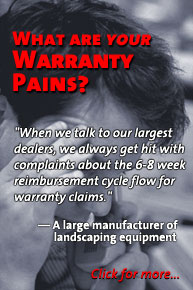February 17, 2003 |
ISSN 1550-9214 |
Extended Warranties:Something worth buying or something to avoid?by Eric Arnum, Editor
Has anyone ever written an advice column against basic manufacturer's warranties? Have they ever advised the buyer to beware, that written warranties are only issued for products that tend to break? Would anyone ever tell you to avoid products that come with warranties, or not to accept a warranty if one is offered? Extended warranties, on the other hand, are written about all the time, and lately all the headlines have been of either one type or another:
This Week in Consumer Electronics, Feb. 10, 2003 or
Potomac News, Dec. 10, 2002 There doesn't seem to be much in between. Either it's a business article in a trade journal or it's a consumer advice column warning against what the author perceives to be a scam. It's either good or it's evil. In fact, those few advice columns that don't warn against extended warranties are frequently affiliated with their sellers in some way. Or they warn against everyone else's extended warranty plans, because they're all deficient in some way. There doesn't seem to be a lot of objective positive opinions out there. They're either negative or they have a vested interest. Some advice columnists relate their own experiences with extended warranty service providers, and it's rarely complimentary. Instead, you find them on sites such as Complaint of the Day or Dealer Tricks Exposed.
"Some companies out there have given us a bad reputation," said one extended warranty company president, "by not being properly backed by insurance companies, and by late or missing claims payments." But he wouldn't name any of those companies, and in fact he declined to allow Warranty Week to identify him. "I'd rather not be quoted criticizing them," he said. Most Important QuestionOne can find numerous advice columns online suggesting what to look for in an extended warranty/service plan. Whether it's an automobile or consumer electronics, they all say the same thing: read the fine print. Know what's covered and what's not covered. That's all good advice. But they frequently miss the most essential question to ask an extended warranty/service plan provider: who insures your plan? An extended warranty or a service plan is essentially an insurance product. It's the price paid for elimination of a risk: that the buyer will incur repair or replacement costs in the future. Medical insurance eliminates the risk of having to pay for health care out of your own pocket. Auto insurance eliminates the risk of loss from accident or theft. An extended warranty eliminates the risk of having to pay for repair or replacement. It's like medical insurance for your purchases. Robert Baily, vice president of product development at ServiceBench Inc., Fairfax VA, said the main difference between a regular and an extended warranty is whether an additional payment is required. With a regular warranty, Baily said, "You're not paying extra for those. Extended service agreements are above and beyond your normal warranty, so you're paying a premium for those." "It really is an insurance product," he said of an extended service agreement. "If it doesn't break within that time, well then you shouldn't have spent the money. But if it does break, you probably come out ahead, depending on how much the repair costs."
This perhaps is part of the reason so many people advise against the purchase of extended service plans. By definition, four out of five purchasers are wasting their money. Their product works fine for the term of the agreement, so in hindsight they realize they didn't need to buy a service contract. Likewise, anyone who doesn't buy a service contract who then finds out they're the unlucky one-in-five will incur a significant cost. Only those who buy the service plan who then have a breakdown are truly getting their money's worth. They're the winners. One finds a similar train of thought in a reasoned comparison of, say, term life insurance and whole life insurance. They're not as blunt, but essentially term life insurance is a waste of money if you live to the end of the term. The same can be said of medical and auto insurance. They're only a good investment if you get sick or have an accident. But you don't typically open a consumer magazine and read an article about how insurance is a scam unless you're unlucky enough to incur a claim. Not Just LuckIt's not just a question of luck, however. An extended warranty also can pre-pay for an inexpensive product's replacement, or fix the price of its replacement. Would you be willing to pay 10% of the purchase price of a $50 item to insure that if you are the one-in-five, that your unit will be replaced for free? What if the seller made it a more interesting bet? Would you pay $2.25 a month for an extended warranty on a $100 product, if the company said that even if it doesn't break, you can take $40 off the purchase price of a replacement after 18 months? What if they promised a free loaner while repairs were under way? In other words, what if they also insure the purchaser against downtime, product obsolescence, and future price increases? When Sears Roebuck and Co. began selling extended warranties some 25 years ago, people didn't know what to call them. Was it some kind of prepaid repair agreement, or was it a form of insurance? And if it was a form of insurance, who was insuring the insurer? Some states stepped in and passed a bunch of laws and regulations as a result, with most requiring some form of reinsurance for service contracts/extended warranties. Reinsurance is a significant expense for most warranty plan administrators, so it's not something they might otherwise buy if it were optional. The basic warranty is a cost absorbed by the manufacturer. It usually costs a few percentage points or less of total sales. It is accounted for as a liability on the manufacturer's balance sheet, and as an expense on the income statement. In contrast, an extended warranty is a revenue-generating and profit-making product. An extended warranty is something both manufacturers and retailers can sell, not to mention unrelated third parties. It removes the financial risk from a purchase above and beyond the initial period deemed appropriate by the manufacturer. An extended warranty reduces the risk of incurring a large repair bill. However, the risk increases if an extended warranty is an in-house offering, and the seller's plan is not backed by a reputable insurance company. Dealers can go out of business. Repair shops can close down. Manufacturers can go bankrupt. What happens if the product outlasts the point of purchase? Who fixes it for free then? Backed By Insurance
"Any program that I personally would buy, would have to be insured by somebody other than the retailer or the selling dealer, because they come and go. Most programs that I know of today are reinsured. And most of them [the reinsurers] are legitimate carriers," he said. For ratings, one need look no further than A.M. Best Co. Inc., which rates the financial strength of insurance companies under a system in which anything from a B+ to an A++ is considered secure, and B to D ratings are considered vulnerable. An E is under regulatory supervision; an F is in liquidation; and an S has had its rating suspended. Paul Swenson, executive vice president of Aon Warranty Group and president and COO of Aon Innovative Solutions, said it's more than just an insurance policy one can judge based on a single grade. "The service aspect of this is also huge," he said, "because it takes the right kind of service network and the right kind of administration in order to make sure the customer has a very positive experience. If they're sold correctly, and if they're administered correctly, they can end up being a tremendous enhancement to the brand of that retailer." If they're sold incorrectly, of course, they can harm the retailer's image more than if there were no extended warranties at all. The biggest consumer complaint with extended warranties seems to be the sudden disappearance of their uninsured service plan administrator. But another significant source of complaints concern lengthy delays, incomplete repairs, hidden costs, and poor communications. In other words, bad service could be more harmful than no service at all. Shaw said that based on his own aftermarket research, the people who buy extended warranties are generally happy with their purchase. "I would say no less than mid 90 percent of those people who we pay claims for, buy extended service, routinely, over and over again. And then maybe there's 5 percent -- I don't think there's anything you did that would satisfy that particular consumer." Except, perhaps, letting them post their story on a Web page. Dealing With Problems"We deal with problems," Shaw said. "I mean, nobody comes to us happy. So we're in the business of problem resolution." And he thinks that 19 times out of 20, the extended warranty plan administrator resolves that problem. "From our perspective," Shaw said, "and I think it's a shared industry perspective, what we sell represents a good value for the price, on those items that would either constitute a large repair bill for a consumer or on the lower end of the product spectrum, those that become commoditized. In other words, for a small amount, you could buy protection that would just replace the item. In that case, we're just insuring the price point. Either way, I think it's a good value proposition. I don't know who would take issue with that." Swenson notes that extended warranties frequently cover items that the basic manufacturer's warranty does not. The basic warranty may cover parts only, and not labor. An extended warranty may cover both. So it's not always just an extension of the term of the warranty. Sometimes it also can be an extension of its breadth. He added that Aon sometimes also works as an underwriter for the manufacturer's basic warranty. "One of the ways we position ourselves is that we are a one-stop shop," he said. Because it's part of a huge insurance company, Aon can be both the plan administrator and the underwriter. "We can provide all the services necessary in order to make sure we are able with our partners to deliver the promise we make to our end user customers."
Meeting Insurance Industry RequirementsAn extended warranty, Swenson said, is a hybrid of a service contract and an insurance policy. But because it's an insurance product, it's also subject to very specific state and federal laws. And it takes an insurance company to know how to remain on the right side of all those regulations. "We make sure that everything we do is in compliance with all federal and state regulations, so that the retailer is always in compliance, we're in compliance, and the end user customer always gets what they bargained for," Swenson said. If one of Aon's clients shuts its doors, Aon is responsible for the remainder of the service contracts. For instance, Aon is the underwriter for Nobody Beats the Wiz, a consumer electronics retailer that limped along for the past year until parent Cablevision Systems Corp. decided to close all its remaining stores last week. Even after all remaining Wiz outlets are closed, Aon will continue to honor the retailer's extended warranty contracts. "We have made very sure through the last several years that we have the right amount of premium reserve, and those customers will be very well taken care of," Swenson said. There won't be any rants on Web pages from Wiz customers who think they were left holding the bag.
Self-Regulating GroupsThere is, however, a national organization with some say over the practices of its members. The Service Contract Industry Council, with its offices in Tallahassee FL, was founded in 1991 by several of the main players in the extended warranty market. SCIC members include Aon, AIG, Assurant Group Consumer Services, General Electric, General Motors, N.E.W. Customer Service Companies Inc., Service Net, and Warrantech. The SCIC's primary goal, however, is to monitor legislative activities and to make sure lawmakers write fair and consistent regulations to protect consumers. SCIC frequently submits model legislation or testifies before committees doing the legislative work. But it doesn't function as a plan administrator of last resort, and it doesn't gather or resolve consumer complaints. So it will be of no help to those unhappy customers left holding the bag after the disappearance of their selling dealer. There seems to be no alternative to government regulation. By setting minimum requirements, regulators can chase the fly-by-nights out of the market. If reinsurance is the biggest expense facing a plan administrator, better to make it mandatory for all than to allow some to go without and thereby undercut the prices of legitimate and long-term providers. In fact, thought the advice columns that warn against extended warranties typically miss the importance of insurance, they all agree on one point: if a plan's low price seems too good to be true, it probably isn't worth much.
| ||||||||||||||||||||||||||||||||||||||||||||||||||||||||||||||||||||||||||||||||||||
| ||||||||||||||||||||||||||||||||||||||||||||||||||||||||||||||||||||||||||||||||||||



 A basic warranty is a statement of quality: we stand behind our product. An extended warranty is an admission that everything breaks eventually. It's an invitation to play the odds: if on average one out of five products sold requires repair or replacement within the term of an extended warranty, do you believe you are buying the one that breaks, or one of the four that doesn't? As you get to the cash register and the clerk asks if you want to buy the extended warranty coverage, are you feeling lucky?
A basic warranty is a statement of quality: we stand behind our product. An extended warranty is an admission that everything breaks eventually. It's an invitation to play the odds: if on average one out of five products sold requires repair or replacement within the term of an extended warranty, do you believe you are buying the one that breaks, or one of the four that doesn't? As you get to the cash register and the clerk asks if you want to buy the extended warranty coverage, are you feeling lucky? With a properly insured extended warranty plan, that ceases to be a problem. There's an insurance company backing up the seller, and there's a reinsurance company backing up the insurance underwriter. No wonder many of the biggest extended warranty plan administrators are part of insurance companies. The Aon Warranty Group and Aon Innovative Solutions Inc. are part of
With a properly insured extended warranty plan, that ceases to be a problem. There's an insurance company backing up the seller, and there's a reinsurance company backing up the insurance underwriter. No wonder many of the biggest extended warranty plan administrators are part of insurance companies. The Aon Warranty Group and Aon Innovative Solutions Inc. are part of  Burt Shaw, executive vice president of
Burt Shaw, executive vice president of  Every retailer knows that happy consumers become repeat customers. However, there are also some interesting correlations between extended warranties and customer satisfaction. Swenson said that when he worked for Circuit City Stores Inc. before moving to Aon three months ago, he found in his research that the most loyal customers were frequently the ones that had purchased service contracts. In addition, he said the most satisfied customers were those who had purchased and actually used the extended service contracts.
Every retailer knows that happy consumers become repeat customers. However, there are also some interesting correlations between extended warranties and customer satisfaction. Swenson said that when he worked for Circuit City Stores Inc. before moving to Aon three months ago, he found in his research that the most loyal customers were frequently the ones that had purchased service contracts. In addition, he said the most satisfied customers were those who had purchased and actually used the extended service contracts. In some states, extended warranties and service plans are treated as insurance products, so they are regulated by the state's insurance commissioners. There are also a handful of in-state groups such as the
In some states, extended warranties and service plans are treated as insurance products, so they are regulated by the state's insurance commissioners. There are also a handful of in-state groups such as the 



